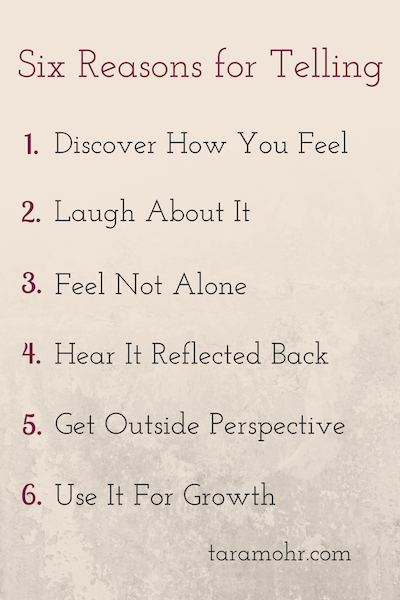Lately, I’ve been thinking about conversations, and particularly, the therapeutic use of them in my life.
When I’m sad, angry, irritated, confused, I know it’s time for me to do some work to process how I’m feeling — to let the feelings be felt, so that I can unearth what they have to tell me, and then move forward.
I have a trifecta of tools I use to do that – three powerful modalities that assist me: writing, talking, and prayer. In other words, sometimes, I choose to write out what I’m feeling. Sometimes I choose to pray about it, turning the situation and my feelings over to something much greater than me, and asking for guidance, clarity, help. And often, I work through what’s going on by talking about it with a friend.
Today, I wanted to dive into that – how we can help each other work through difficult situations through conversation.
One of the places we get into the most trouble in important conversations with loved ones is in confusion about what kind of conversation we’re having. Maybe you just wanted someone to listen to you with love, but instead you got an advice lecture. Or maybe you were dying to hear your friend’s honest perspective, but she didn’t want to be intrusive, so instead just said a bunch of empathetic, “I’m so sorry’s!” and, “That sounds so hard.”
Today, I want to share six “reasons for telling,” six different reasons we might want to share about a difficult situation with a friend or a loved one.
Use this list to help you discern what you want from a specific conversation. Knowing what kind of support you want in a conversation, and communicating that, is one way to take really great care of yourself.
You can also use this list as a listener, to remember the different ways you can be of support in a conversation, and to ask for clarification from the speaker about what they are looking for.
Six Reasons for Telling
1. To discover what you think and feel. Talking to a patient listener whom we love and trust, we often make surprising and important discoveries about how we really feel. “This is what really hurts about what happened.” “You know? As I’m talking I’m realizing, my real fear here is this …” Or “Gosh, this feels so familiar. I think this is connected to how I used to feel with my family.” It’s in the unfolding, the unpacking, the unraveling of the knots of thoughts and feelings that we can bring each into the light and discover what’s truly going on for us.
2. To laugh about it. I do this one so much with my friends that sometimes now, even in the midst of something challenging happening, I have the thought, “I can’t wait to tell x about this so we can laugh about it.” Situations that can feel so irritating, or out of control in the moment, can become absurd and hilarious when related to a dear friend. Laughter is therapeutic, and shared laughter over what challenges us is incredibly healing.
3. To not feel alone. We share to hear, “Oh I’m so sorry that happened to you.” Or, “That is appalling. I can’t believe she did that! I’m sorry honey.” Empathy, validation, solidarity, love. When we don’t feel so loved by life, or when circumstances are hard, it helps to hear from others that they don’t want us to hurt or suffer, that we are not alone. We get a little more stamina for the journey ahead. We’re buoyed up by others’ love for us.
4. To gain clarity by hearing your feelings reflected back to you. Sometimes, we don’t quite know how we feel, even as we talk about something. But a good listener can reflect back to us what they are hearing: “It sounds like you had some expectations and you’re feeling disappointed.” “I know you’re saying you are angry, but I’m also hearing that you are really scared.” If their assessment is right, we feel heard. We get clarity. But even if they are wrong, their wrong assessment will help us discover what we are really feeling. The other person might say, “It sounds to me like you just want to make a decision on this.” “No, that’s not quite it,” you might say, “I think it’s more that I want to better tolerate this time of uncertainty.” Together, through the back and forth, you can uncover what’s true for you.
5. To get outside your own perspective, and hear someone else’s. We’re all familiar with this one – because it’s quite overused in our culture. We share because we want to hear what someone else thinks about the situation, what they would advise us to do, what they think is right. This can be wonderfully valuable – if we have advisors we admire and trust – and if we know how to discern what advice resonates for us and what advice isn’t really right for us.
6. To use the difficult situation for our own growth. This is where things get magical. When we share about a difficult situation in our lives, not just to vent, not just to clarify how we are feeling, and not even just to get support, but then to consider with someone else: what is this situation really about, in terms of the learning curriculum life is giving me? How does this situation offer me an opportunity to leave behind an old pattern, heal an old wound, be better to others or myself in some particular way than I’ve been before? This is where we get to spin our challenges into the gold of our evolution. In this kind of conversation, it’s the friend that might help us turn away from blaming or feeling attacked, and uncover the higher purpose for which the situation can be used.
To make this practical:
1. The next time someone in your life comes to you with a problem or difficult situation (a mentee, a team member at work, a child or other family member, or a friend), ask them, “What kind of support would you like from me here?” Give them some ideas if they aren’t sure what you mean – “Just listening, or advice, or helping you unpack what you want here?”
2. Think of one situation in your life right now that you’d like to talk over with a dear friend or loved one. What kind of support do you want from them around it? Clarify this for yourself and ask for it.
Let me know how it goes.
Love,
Tara








Wow. Not only love these pointers, but as a visual journaler (that may not be a word, but you get it) your sentences rock!!! ie. “It’s in the unfolding, the unpacking, the unraveling of the knots of thoughts and feelings that we can bring each into the light ” HELLO! So love that! And… “what is this situation really about, in terms of the learning curriculum life is giving me?” I’ve written both of these down to work around in my journal. You are awesome and I keep your book by my bed always, even though I’ve read it twice! It reminds me that, contrary to how I often feel, I am ONE of MANY – not at all alone in my struggles. Thank you for your brilliance and for sharing. xo Anna
This is yet another piece of brilliance from Tara. I had just finished listening to a good friend about a difficult situation in her life (because of changes she’s making and the subsequent fall-out) – and bam, your blog is the next item in my Inbox. I’ve forwarded your wisdom and thank you for it. I loved your book and always read your blogs!
I really love this Tara, thank you.
Thank you Tara,
I’ll read your article more carefully over good strong coffee in an hour, but at a quick glance it deeply resonated with me as ‘true’.
That technique for more effective conversations sounds SO useful. And such a simple elegant solution to a complex problem. I’m going to start using it today.
Thank you,
Rebecca Stafford
I always look forward to reading your pieces. They always resonate with me. I’ve recently been invited to contribute to a women’s network and this is fantastic inspiration to encourage the women.
Blessings
Funmi
This is awesome. Thank you!
First off, I like to thank you for taking time in your busy life, even though writing is part of your job, to share such imperative applicable advice with other people. Secondly this is a wonderful article, per usual, but one thing is yes, having someone that you admire and trust for advice to go to. Magically one such person in my life has just reappeared!